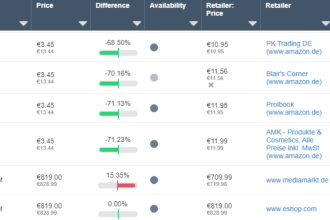A career entails far more than just a job but a career starts with a job. Not just anyone with enough time, determination, or desperation can find work because it involves more than just a degree. Especially in this pandemic, most people can’t find work that pays the bills really easily not just because they lack the skills, but because their interview skills are bad. However, unlike finding a job, building a career is a lifelong endeavor. Building a career necessitates dedication, both to oneself and to one’s work. Creating a career requires perseverance because it is not always easy to find fulfilling work while moving up the career ladder—and many career paths these days do not resemble a ladder at all, but rather a long and winding road.
For the past few weeks, we have been reviewing the best-selling books on Amazon in the category of Job interviews. It will interest you to know that Christine Reidhead‘s book on Job Interview ranks on top. But wait, what’s is this book about and why are people yelling for it? The book from Christine’s camp is titled “Get That Job”
Even if you know that developing a career necessitates careful consideration of the type of life you want to live, you still can’t achieve it without passing a job interview.
What “Get That Job” is about
You need to convince your employer that, out of the numerous candidates whose resumes have been selected, you are the best candidate for the job. You will admit that it isn’t easy but this book makes it easy.
You will explore questions that arise in job interviews and the common weaknesses of job interviews. Here is a lot more involved than just meeting with the company and telling them about yourself and your capabilities. Below is the table of contents.

Looking at the tables tells how interesting and useful this book might be for job seekers. Further highlighting a brief overview, check the chapters involved below.
Chapter One
Types of Job Interviews
There are different types of interviews according to what works best for the recruiter. The different types are usually dependent on the location of the interview, time factor, and what the recruiter intends to achieve with the interview. As the candidate, you are supposed to prepare beforehand for all the types so that you will be ready for whatever the recruiter chooses. The three main types of interviews are:
- Face-to-face interview
- Telephone interview
- Video interview
Let’s explore them in detail.
Video Interview
Video interviews are becoming more and more popular these days because they save time and cost and collapse the barriers of time and location. This, like the telephone interview does not involve a physical meeting. But, unlike in the telephone interview, the interviewer will get to see you talk this time and you have a lot of preparations to do just like you would prepare for a face-to-face interview.
No professional will call you for a video interview without scheduling it first, so you will always have enough time to prepare and build confidence. Let’s talk about how best to prepare for a video interview and land you that job.
- Get the Necessary Equipment Ready: The first thing to do in preparation for a video interview is to get the required technology ready. It is highly advisable that you do not use the in-built camera of your laptop; those in-built cameras are usually of a poor quality. Get an external camera and a microphone, too. It is important that your interviewer sees you and hears you clearly enough without having to strain their eyes or their ears. Make sure that you have a good internet connection; you definitely do not want an on-and-off occasion during your interview session. This is absolutely not the best time to use your

Chapter Two
3 Stages of the Interview Process and How Best to Behave at Each Stage
You now know the types of interviews to expect and the best practices for each type; next is the stages of the interview process and how best to behave at each stage. These stages are primarily for the face-to-face interview, but most of the practices here also apply to the other types of interviews. The interview does not begin the moment you are before your interviewer; neither does it end immediately you leave the interview venue. To give your job interview your best shot, you must prepare holistically and take every stage seriously, so that at the end of the day you will be satisfied with the knowledge of the fact that you have done your best. Do not only tell the recruiter that you are the best. Be the best.
Here are the stages of the job interview process and how to behave at each stage.
Before the Interview
Before the scheduled date of the interview, you need to get yourself ready both physically and psychologically and ensure that nothing at all will steal
After the Interview
When you are done with the interview, you have done most of what you need to do. But the game is not over yet, there is still something else to do. What you do after the interview is as important as what you did before and during the interview because the recruiter’s final decision may even be based on your overall attitude, including your attitude after the interview. And if you do not get it right, all the preparations you have done will be wasted.
Here are some important things you should do after your interview
- Just as soon as the interview ends, ask your interviewer how you should follow up and get the contact details of the person or persons that interviewed you. You will need those contacts for sending thank you notes.
- Send your interviewer a thank you note or email. If it was a phone or video interview, there was no physical contact, so a thank you email would suffice. But in a case of a face-to-face interview, mailing a physical thank-you note is also a good idea. You will be giving your recruiter something to remember you for. In the note, express your gratitude for having been given the opportunity for
Chapter Three
12 Most Common Job Interview Questions and How Best to Answer Them
No two job interviews are the same. But job interviews generally follow a similar pattern with similar questions. So, you need to arm yourself with the kind of questions you should expect and the best response for each question. Recruiters are also aware of the fact that there are many blogs out there with the title ‘How to Answer Job Interview Questions’ and they can tell when you are merely reciting what you have memorized from another source. In other words, this is a guide on how to answer the questions and not exactly how you should answer the questions. I am giving you a pattern and some strategies; it is left for you to tailor these down to fit your own personal experiences.
Here are some of the most common job interview questions and how to answer them:
-
Tell us about Yourself:
This is usually the first question and asked at practically all job interviews. You should expect it and prepare for it beforehand. It is however,
Chapter Four
10 Common Job Interview Mistakes and how to Avoid them
From all we have been exploring, you would have started noting some things to avoid during the process of a job interview. There are some mistakes that constantly reoccur especially among fresh graduates who are having their first interview. Let’s go through them now and tell you how to avoid them so that you can land yourself that job.
The 10 most common job interview mistakes are:
-
Overconfidence
It is common for job interview candidates to become too confident after they have read a lot of resources on how to be confident at a job interview. It is bad for you not to be confident, but it is equally a turn-off if you are too confident. You don’t want to leave your interviewer feeling intimidated by you. Be confident enough to express yourself boldly, but make sure you strike a balance because there is just a thin line between being very confident and being arrogant.
This is a book you cannot afford to miss especially as a job seeker. You can check out on Amazon for a copy.














